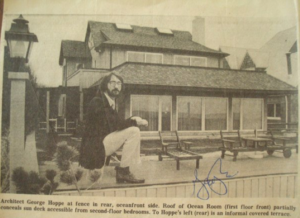
With Father’s Day approaching, I’d like to share a story about the man and the moment that shaped my life as I know it. My father, George K. Hoppe, was the owner of a small architectural firm in Lavallette, New Jersey. He designed beach homes along the shore, funeral homes, retail buildings, and the Ocean County Boy Scouts building in New Jersey. He had seven children, the youngest being me, and two step-children. He loved baseball and pistachios, coached all of his kids’ baseball and softball teams, and was active in his communities’ efforts in affordable housing development and the local rotary club. It’s now been seven years since his death from a preventable heart attack at age 61.
My dad died because he did not have health insurance. After the Great Recession in 2009, things with the family business got tight. My dad had let go of his staff, and could no longer afford health insurance for himself or the family. Living with him, we learned to count pain on a scale from 1-10, which was almost always cut in half due to our “inexperience,” and took L-Lysine, Sudafed, or Ibuprofen for most ailments. As most things go with health, that strategy worked until it didn’t.
My dad had what experts call one of the silent killers: high cholesterol. This medical condition is silent because there are no symptoms; a person needs to see a doctor and have a blood test to obtain the diagnosis. It’s a chronic condition, but one that can be regulated with prescription medication. Unregulated, it is a killer: bad cholesterol builds up in your arteries, hardening and narrowing them, which can lead to blood clots and inflammation that cause heart attacks.
Four months before his heart attack, my dad visited the hospital for incredible pain behind his knee. At the time, he had taken up work at the local Macy’s department store to make ends meet. The job did not come with health insurance.
When he showed up at the hospital, on a scale of 1-10, his situation was about a 10. He was ordered to come back for follow up visits and treatment, but his self-prescribed treatment was a hefty daily dosage of ibuprofen.
After a few months, he developed what he said was a persistent chest cold. I remember suggesting he visit the doctor, and getting a firm “no” in reply. He got slower, more tired, but kept up with full time work at Macy’s, and part-time softball booster for my school and travel team. Days before his death he complained despairingly to me about his chest feeling gassy. I had seen a commercial for GasX, and the symptoms seemed to be similar to his complaints, so I went out to the store and bought him a box.
On the morning of April 15, 2011, my dad had a heart attack while reaching into his bag for his GasX and ibuprofen at the Clara Barton rest stop in New Jersey.
We did not opt to have an autopsy done, so it is hard to say with 100 percent confidence that it was either the high cholesterol or the possible blood clot that caused this heart attack, and whether the first led to the next. What we can say with 100 percent confidence is that if my father had had health insurance, he could have found out before it was too late.
With health insurance, my dad would have made the appropriate appointments with an orthopedist and a cardiologist. He would have had the right tests and procedures done, and he would have been able to manage his chronic condition.
That’s true not just for my dad, but for a lot of Americans. Experts at Harvard have found that the Affordable Care Act’s (ACA) expansion of access to coverage led to significant increases of diagnoses of silent chronic conditions like hypertension and high cholesterol. Access to private insurance also decreased barriers to medical care, increasing the use of prescription drugs and hospital outpatient services.
Without health insurance, my dad was effectively barred from obtaining the medical care he needed. Hospital visits for the uninsured are notably expensive, and specialists are hard to reach without insurance. Further, without the ACA’s rules protecting people with pre-existing conditions, it was likely my dad would have been prevented from enrolling in insurance even if he could have afforded it, due to his chronic high cholesterol.
Without health insurance, my dad self-prescribed himself daily doses of GasX and ibuprofen, a practice that is recommended for inflammation but detrimental to heart health. This Father’s Day, with my dad seven years gone, I miss him, and am grateful that so many more families have extended time with their families, thanks to the ACA.
George K. Hoppe March 8, 1950 – April 15, 2011




2 Comments
Your story warms my heart with hope that those uninsured will find a pathway for insurance because of the ACA.
Thank you so much for sharing your Dad with the world. His story highlights one that is often left out of the common narrative. He was not a slacker, lazy, or sucking off the system. He was well-educated and had a marketable skill. But as one of millions of uninsured people, he was only able to come through the ER doors of a hospital, which is not a long-term solution for anyone, especially the loved ones left behind like you.